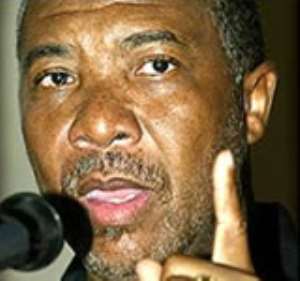
Liberia s ex-President Charles Taylor rejected complaints from Sierra Leone rebels about atrocities committed by his fighters, his ex-deputy has said.
The RUF rebels were notorious for mutilating civilians but their leader Foday Sankoh complained to Mr Taylor about Liberian troops, said Moses Blah.
Mr Blah told Mr Taylor s war crimes trial that his former boss responded by threatening to withdraw his troops.
Mr Taylor denies 11 counts of crimes against humanity and war crimes.
Mr Blah, who briefly succeeded Mr Taylor as president, is the most senior figure to testify in The Hague.
He is accused of helping Sierra Leone s Revolutionary United Front (RUF) rebels in their brutal conflict with the government.
Human flesh
But the BBC s Hassan Arouni in The Hague says that Mr Blah told the court that RUF rebel leader Foday Sankoh personally complained to Mr Taylor about atrocities committed by Liberians helping the RUF.
The RUF were known for chopping off the arms and legs of civilians, as well as killings and rape.
"We had men in Sierra Leone fighting... associated with the RUF," Mr Blah said.
He earlier said that the commander of one of Mr Taylor s units in Liberia "had a habit of eating fellow human beings".
He said he saw Nelson Gaye roast a human hand on a fire and eat it with boiled cassava.
Mr Blah said that Mr Gaye s Marine unit was one of Mr Taylor s forces, which he had been told should not be pursued if they committed atrocities.
But Mr Taylor is only on trial for his alleged role in the Sierra Leone conflict, not that in Liberia.
As Mr Blah took the witness stand, he was careful not to look at the man he served for nearly 20 years.
He gave the court a detailed account of Mr Taylor s bloody rise to power and acknowledged the use of child soldiers.
Mr Blah became vice-president of Liberia in 2000. He became president after Mr Taylor was forced into exile in 2003.
However, he was only Liberian president for two months, until October 2003, when a United Nations-backed transitional government was sworn in.
He came to the Hague reluctantly, but said he intended to tell the truth.
"I m not going to crucify him - he s my former boss," Mr Blah told the BBC s Focus on Africa programme before travelling to the Hague.
"I have nothing personal against President Taylor - we worked together almost like brothers; we had a revolution going together, so I don t think I m going to betray him," he added.
Aggressive
In court, Mr Blah provided a detailed insider s account of the early days of the civil war.
He said he was one of the first 20 or so rebel fighters who received training at a military base in Burkina Faso.
It was not until a larger group was assembled at a military camp in Libya that Mr Blah met Mr Taylor.
They trained alongside rebels from The Gambia, Sierra Leone and the Philippines, all of them supported by the Libyan authorities.
Mr Blah said that Sierra Leone rebel Sam Bockarie was in Libya and called Mr Taylor "chief".
Mr Blah told the court that when the time came to invade Liberia, three truck loads of weapons were provided by the defence minister of Ivory Coast.
Within days of crossing into Liberia in 1990, Mr Blah says he was briefly detained by child rebel fighters recruited by his own side.
He said they were used because they took orders and were "unreasonable and aggressive".
A lawyer representing Mr Taylor, Terry Munyard, told the BBC his client was not worried about Mr Blah s evidence and if he told the truth there was nothing to fear.
Mr Taylor took up arms in Liberia in 1989, before being elected president in 1997 after a peace deal.
He is accused of sending guns and fighters to Sierra Leone in exchange for diamonds.
During Sierra Leone s decade-long civil war, which officially ended in 2002, tens of thousands of people died and thousands more were mutilated or raped.
Mr Taylor s case has been transferred from Sierra Leone to the Hague for security reasons, although it is still being conducted by the UN-backed Special Court for Sierra Leone.
Source: BBC




 Lay KPMG audit report on SML-GRA contract before Parliament – Isaac Adongo tells...
Lay KPMG audit report on SML-GRA contract before Parliament – Isaac Adongo tells...
 Supervisor remanded for stabbing businessman with broken bottle and screwdriver
Supervisor remanded for stabbing businessman with broken bottle and screwdriver
 NDC watching EC and NPP closely on Returning Officer recruitment — Omane Boamah
NDC watching EC and NPP closely on Returning Officer recruitment — Omane Boamah
 Your decision to contest for president again is pathetic – Annoh-Dompreh blasts ...
Your decision to contest for president again is pathetic – Annoh-Dompreh blasts ...
 Election 2024: Security agencies ready to keep peace and secure the country — IG...
Election 2024: Security agencies ready to keep peace and secure the country — IG...
 People no longer place value in public basic schools; new uniforms, painting wil...
People no longer place value in public basic schools; new uniforms, painting wil...
 'Comedian' Paul Adom Otchere needs help – Sulemana Braimah
'Comedian' Paul Adom Otchere needs help – Sulemana Braimah
 Ejisu by-election: Only 33% of voters can be swayed by inducement — Global InfoA...
Ejisu by-election: Only 33% of voters can be swayed by inducement — Global InfoA...
 Minority will expose the beneficial owners of SML, recover funds paid to company...
Minority will expose the beneficial owners of SML, recover funds paid to company...
 Prof. Opoku-Agyemang has ‘decapitated’ the NPP’s strategies; don’t take them ser...
Prof. Opoku-Agyemang has ‘decapitated’ the NPP’s strategies; don’t take them ser...
